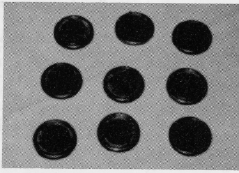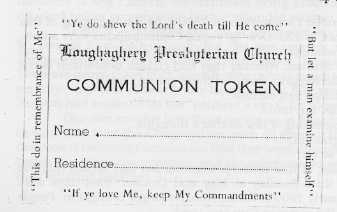|
CHAPTER 3
ELDERS.
| There is no record of the Elders prior to 1800, but in 1800 the Elders in
office were - Samuel Swords, Ballymurphy; Clerk of Session. Michael
Magowan, Cargygray; William White, Cabra; William McKee, Cargygray; Thomas
Deyarmon, Cargygray; Joseph Stewart, Burren; John Rogers. |
| Elected in 1816 - Samuel Archer, Drumlough; John McAuley, Ballycrune; John
Patterson, Ballycrune; Samuel Mack; Thomas Blain, Burren. |
| Elected in 1829
John McBride, Ballykeel-Lougherne; William Kearns, Magheraconluce. |
| Elected in 1834 - Oliver Edgar, Cargygray; John Blain, Burren; Thomas
Garrett, Clintagh. |
| In 1843 - James Chambers, David Shaw, Boardmills, |
| Elected in 1849 - William Dornan, Ballykeel-Lougherne, James Stewart,
Burren; Thomas Jamison, Clintagh; George White, B_ allyhomra; James
Martin, Cabra. |
| Elected in 1872 - David Wallace Shaw, Ballylintg; John Patterson,
Ballycrune; Robert Trimble, Magheraconluce; Joseph Kee, Clintagh; Robert
Mack, Mullaghdrin. |
| Elected in 1907 - William J. Magill, Mullaghdrin; James McClelland, Cabra;
Samuel A. Bell, Ballylinta; Robert McDonald, Magheraconluce; Andrew
Clements, Ballycrune. |
| Elected in 1926 - Samuel Gourley, Magheraconluce; William Irvine,
Cargygray; Robert Bateson, Mullaghdrin; John Scott, Clintagh. |
| Elected in 1946 - Samuel A. Bell, Ballylinta, Jim Eddie, Ballycrune; John
McDonald, Magheraconluce; Robert Middleston, Cargygray. |
| Elected in 1966 - Richard Irvine, Cargygray; Thomas Gourley, Ballycrune,
Bertie Graham, Ballycrune, Thomas Mitchell, Magheraconluce. |
| Elected in 1975 - Mary Reid, Magheraconluce; Fred Scott, Ballymurphy;
Oliver Greer, Aughnaleck; Jim McKibben, Ballycrune. |
In the early 1800's a district of the congregation was committed to each
Elder over which he was expected to take special oversight, and be able to
report. He was expected to visit the sick, to admonish and reprove
disorder, to recognise scandals, to superintend prayer meetings, and to
accompany the minister in the annual visitation. The Session seemed to
meet nearly every Sabbath morning in the Session house, or Retiring house
as it was called in those far-off days, especially before Communion and
Baptism. The Elders seemed to do what was expected of them in ferreting
out scandal or trouble, so that no unworthy person would be admitted to
Communion or have a child baptised.
Examples of such cases:
30.7.1847 "appeared Mary - acknowledging sin of stealing turf from John -.
She was dealt with by Session and further rebuked from the pulpit
before the congregation. Showing contrition she was admitted to
Communion."
In 1806 the minutes read -
"Hugh - acknowledging evil of permitting a free-mason dance in his barn,
was severely rebuked by Session and publicly rebuked from the pulpit, but
showing repentance was admitted to Communion.
Another quotation from minutes - "Rebecca - acknowledging sin and scandal
of fornication with a man called -. She was dealt with by the session,
confessing her sin and showing evidence of repentance, was rebuked and
asked to appear again a week later." (Poor girl!).
"Again appeared as asked, was publicly rebuked and expressed desire to be
restored to the Fellowship from which she had fallen. She was further
dealt with and restored to the Fellowship." She was permitted to come to
Communion.
�Top
1827 "Appeared before session Mary G- professing fornication with Thomas K
-. She having a child so begotten, six weeks old". Mary was severely dealt
with by Session and publicly chastened from the pulpit, but after showing
repentance she was admitted to communion.
Another sin described in Minutes is irregular, clandestine or underhand
marriages. It would seem that these pairs didn't get a proper licence and
hadn't their marriages proclaimed. I think they had what we in modem terms
would call a Civil marriage. When these people applied to take communion
there was trouble. They had to produce witnesses who had seen them
married.
11th August 1803. "Richard N- of Cargygray and Jane G- his wife
acknowledging clandestine marriage by Blakely of Ballynahinch, under whose
hand no certificate was produced Rachel McN- was the sole witness, who
made oath in Session that she was present when said Richard and Jane did
vow to be husband and wife to each other until death." This was accepted.
1807 William - and his wife Mary, acknowledging clandestine marriage by
Blakely, Ballynahinch and their sin and sorrow for not hitherto being
members of any Church. No certificate being produced, they were publicly
rebuked before congregation having wounded' religion."
"John M- acknowledging sin of using objectionable language to Mrs. W-
coming from Ballynahinch fair. He was severely rebuked, but showing sorrow
was permitted to come to Communion. These are not isolated cases. There
are many, many such cases lasting right through the 1800's and into this
century - a period of nearly one hundred and fifty years. Almost weekly
the Session had someone on the "penitent's stool' for something or other.
One can imagine how these people must have felt in having to face the
Session and later the Congregation, with all eyes on them, but they were
so desirous of receiving Communion that they went through with this
humiliation before the entire congregation, and the same applies when it
came to having their children baptized.
CHAPTER 4
THE SACRAMENTS, THE LORD'S SUPPER
This Sacrament from the earliest records seems to have been held twice
yearly, but not on set dates. It varied from year to year. Tables and
forms were put in the aisles, which were wider before the extensive
renovation of 1895, and the congregation sat around. There were possibly
several sittings and each one had an address.
There were five services - Preparation Sabbath, (one before) Humiliation
and fast day, (usually Wednesday) Pre-Communion (Saturday), Sacrament
Sabbath and Thanksgiving, (Monday). The Wednesday, Saturday and Monday
services were held in the forenoon.
The following is a copy of the financial side of Communion.
|
1806 Collections |
|
Expenses |
|
| Aug. 25. Preparation Sabbath |
5s. 4d |
4 gals Port Wine |
�2 6s Od |
| Aug 28 Fast Day |
l 0s 2d. |
1 Gal. whiskey |
9s 8d. |
| Aug 31. Sat. |
8s 8d. |
Bread |
6s 3d. |
| Sep. 1 Sacrament Sabbath |
�1. l 1s. 9d. |
Minister's Expenses |
�1. 2s. 9d. |
| Sept. 2 Thanksgiving Day. |
4s. 9d |
Precentor |
7s. 7d. |
| Baptisms |
7s. 7d. |
Paper & Little Exp. |
Is. 3d. |
| |
�3. 8. 3d |
Alex. Sutherland. Sexton |
7s.7d. |
| |
|
Mrs. Sutherland (washing
tablecloths) |
2s. 8d. |
| |
|
|
�5. 3s. 9d. |
By 1840's the whiskey had disappeared from the scene, and wine instead of
port was used.
�Top
150 - 160 attended Communion in 1800's, by the beginning of this century
this had dropped to 120. Over 30 young Communicants were admitted each
year. Before admission they had what was called an exam - oral questioning
before the Session. Whether they had classes beforehand is not clear.
Interesting are the remarks made on these young people:
Jane D-Weak in knowledge, but earnest.
Mary M- Sensible, but timid.
Martha
D- Has something of her mother's thoughts.
John W- Very ignorant.
William G- Good. and so on.
By the beginning of this century, Communion had settled into the pattern
of today, the third Sunday in May and October. Fast days were continued on
into the early 1900's. Tables were no longer brought in. People sat in
their pews, and the common Cup was used.
These cups and the chalices were presented in 1897 by Mrs. Lyons (Magheraconluce),
and can still be seen at each Communion service.
Before that pewter cups probably, were used. In 1957 Individual Cups were
presented by the Young People's Guild and the Girls' Auxiliary. They were
handed over by Mary Reid for the Girls' Auxiliary and Wallace Beatty
representing the Young People's Guild. At the same time Card Tokens were used for
the first time, instead of the old lead coin tokens, some of which are
still in the cupboard of the Minister's room. In 1941 Pre-Communion was
changed to Friday evening instead of Saturday morning.
In 1951 Our Communion Table was given by Mrs. Irvine (Bangor) and the
chairs by her sister Miss Gill in memory of their father.
Back to the past again. In 1843 those who were two years of more in
arrears of Stipend and because of such had forfeited their claim to
Communion were to be sent a circular reminding them to pay, and also those
who were
enjoying the fellowship of Communion, but were not pew holders to be asked
to pay pew rents.
 |
 |
| The old lead Communion Tokens in use up until 1957. |
The present token |
�Top
|